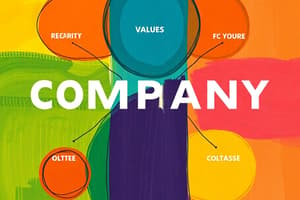Podcast
Questions and Answers
According to Karl Marx, what is the primary cause of alienation in capitalist societies?
According to Karl Marx, what is the primary cause of alienation in capitalist societies?
- The inherent monotony of labor.
- Insufficient compensation for labor.
- Work becoming disconnected from its purpose and devoid of creative expression. (correct)
- Lack of opportunities for intellectual development.
Which of the following reflects the 'instrumental value' of work?
Which of the following reflects the 'instrumental value' of work?
- Developing virtues like perseverance and discipline.
- Cultivating camaraderie with colleagues.
- Achieving financial stability and social status. (correct)
- Finding a sense of purpose.
How does the 'Human Fulfillment Model' view the role of work in an individual's life?
How does the 'Human Fulfillment Model' view the role of work in an individual's life?
- As less meaningful compared to intellectual or artistic endeavors.
- As a path to self-actualization and the fulfillment of one's Telos. (correct)
- As a means to financial independence, which ultimately is all that matters.
- As a necessary evil to sustain life's pleasures.
What is the central question posed by Norman Bowie's Kantian theory within the 'Liberal Model of Work'?
What is the central question posed by Norman Bowie's Kantian theory within the 'Liberal Model of Work'?
Which of the following is an example of the 'Classical Interpretation' of work?
Which of the following is an example of the 'Classical Interpretation' of work?
How do indulgent cultures differ from restrained cultures?
How do indulgent cultures differ from restrained cultures?
Which core principle of ethical leadership is best demonstrated when a manager takes responsibility for a failed project?
Which core principle of ethical leadership is best demonstrated when a manager takes responsibility for a failed project?
What is a key step in building a values-based corporate culture?
What is a key step in building a values-based corporate culture?
Which of the following best describes corporate culture?
Which of the following best describes corporate culture?
A company operates in both the United States and Japan. In the U.S., gift-giving to business partners is generally seen as inappropriate, while in Japan, it's a sign of respect. How should the company navigate this cultural difference to maintain ethical standards?
A company operates in both the United States and Japan. In the U.S., gift-giving to business partners is generally seen as inappropriate, while in Japan, it's a sign of respect. How should the company navigate this cultural difference to maintain ethical standards?
According to the views presented, which philosopher saw work as a necessary means for survival, but believed that activities like philosophy offered a higher form of fulfillment?
According to the views presented, which philosopher saw work as a necessary means for survival, but believed that activities like philosophy offered a higher form of fulfillment?
In a company with a high power distance culture, what behavior would you most likely observe?
In a company with a high power distance culture, what behavior would you most likely observe?
Which of the following represents a modern application of the ethical principle of fairness in leadership?
Which of the following represents a modern application of the ethical principle of fairness in leadership?
Which of Hofstede’s cultural dimensions reflects the degree to which a society values long-term commitments and respect for tradition?
Which of Hofstede’s cultural dimensions reflects the degree to which a society values long-term commitments and respect for tradition?
How might a company with a strong 'collectivist' culture differ from one with a strong 'individualistic' culture?
How might a company with a strong 'collectivist' culture differ from one with a strong 'individualistic' culture?
How might a company best integrate its core values after a merger with another organization that has a different culture?
How might a company best integrate its core values after a merger with another organization that has a different culture?
Which perspective acknowledges that work can be both a source of fulfillment and a cause of stress and dehumanization?
Which perspective acknowledges that work can be both a source of fulfillment and a cause of stress and dehumanization?
Which of the following exemplifies a company with a low uncertainty avoidance culture?
Which of the following exemplifies a company with a low uncertainty avoidance culture?
How does the physical space within a company's offices reflect its corporate culture?
How does the physical space within a company's offices reflect its corporate culture?
If a company has a strong 'masculine' culture according to Hofstede’s dimensions, what is it likely to prioritize?
If a company has a strong 'masculine' culture according to Hofstede’s dimensions, what is it likely to prioritize?
What is the potential impact of an ethnic or religious culture on an organization's corporate culture?
What is the potential impact of an ethnic or religious culture on an organization's corporate culture?
Flashcards
Marx on Alienation
Marx on Alienation
In capitalist societies, work can become alienating and disconnected from its purpose, according to Marx.
Instrumental Value of Work
Instrumental Value of Work
Work is a means to achieve financial stability or status.
Character Development via Work
Character Development via Work
Work builds virtues like perseverance and discipline.
Classical Interpretation of Work
Classical Interpretation of Work
Signup and view all the flashcards
Work as Self-Actualization
Work as Self-Actualization
Signup and view all the flashcards
Corporate Culture
Corporate Culture
Signup and view all the flashcards
Beliefs and Values (in Corporate Culture)
Beliefs and Values (in Corporate Culture)
Signup and view all the flashcards
Communication Style (in Culture)
Communication Style (in Culture)
Signup and view all the flashcards
Use of Space and Time
Use of Space and Time
Signup and view all the flashcards
Hierarchy and Power
Hierarchy and Power
Signup and view all the flashcards
Power Distance
Power Distance
Signup and view all the flashcards
Individualism vs. Collectivism
Individualism vs. Collectivism
Signup and view all the flashcards
Uncertainty Avoidance
Uncertainty Avoidance
Signup and view all the flashcards
Feminine Cultures
Feminine Cultures
Signup and view all the flashcards
Indulgent Cultures
Indulgent Cultures
Signup and view all the flashcards
Restrained Cultures
Restrained Cultures
Signup and view all the flashcards
Integrity
Integrity
Signup and view all the flashcards
Accountability
Accountability
Signup and view all the flashcards
Empathy
Empathy
Signup and view all the flashcards
Fairness
Fairness
Signup and view all the flashcards
Articulation of Values
Articulation of Values
Signup and view all the flashcards
Study Notes
- Corporate culture encompasses shared values, beliefs, and behaviors which dictate the way things are done within an organization.
- It greatly influences interactions among employees and external stakeholders alike.
Key Elements of Corporate Culture
- Beliefs and Values: Shared ideas about work ethic, teamwork, and integrity.
- Communication Style: Can be formal or informal, structured (hierarchical) or open (open-door policy).
- Use of Space and Time: Office layout, flexibility in work hours, and attitudes about deadlines.
- Hierarchy and Power: Determines the decision-making process, either concentrated or distributed.
Levels of Corporate Culture
- Culture exists at ethnic, religious, and organizational levels.
- Ethnic or religious culture affects perceptions of authority and teamwork.
- Organizational culture defines operational methods within a company. Google's culture emphasizes innovation, while traditional finance firms focus on formality.
- Apple emphasizes innovation and creativity.
- Amazon emphasizes efficiency and customer obsession.
Hofstede's Cultural Dimensions
-
Six dimensions to analyze cultural differences in organizations were identified.
-
Power Distance: Acceptance level of unequal power distribution.
- High Power Distance: Strict authority and clear hierarchy expected.
- Low Power Distance: Open communication and flat management structure.
-
Individualism vs. Collectivism: Prioritization of personal goals versus group loyalty.
- Individualism emphasizes personal success.
- Collectivism focuses on group harmony and shared success.
-
Uncertainty Avoidance: Comfort level with ambiguity and risk.
- High Uncertainty Avoidance: Preference for rules and stability.
- Low Uncertainty Avoidance: Flexibility and openness to change.
-
Time Orientation: Centers on long-term versus short-term results.
- High Long-Term Orientation: Focuses on tradition and perseverance.
- Low Long-Term Orientation: Focuses on immediate success.
-
Masculinity vs. Femininity: Highlights assertiveness versus nurturing.
- Masculine Cultures: Value competition and success.
- Feminine Cultures: Focus on relationships and quality of life.
-
Indulgence vs. Restraint: Degree of freedom to fulfill desires.
- Indulgent Cultures: Encourage fun and personal enjoyment.
- Restrained Cultures: Emphasize discipline and control.
-
Culture shapes perception of right and wrong, varying among cultures.
-
Ethics forms a framework for evaluating actions and decisions.
-
Gift-giving may be seen as respect in some cultures, or bribery in others.
-
Ethical leadership focuses on fairness, responsibility, and empathy.
-
Leaders establish the organization's culture and behavior.
Core Principles of Ethical Leadership
- Integrity: Act according to moral principles.
- Accountability: Take responsibility for actions.
- Empathy: Understand employee needs.
- Fairness: Treat everyone equally.
- CEOs who ensure fairness and prioritize well-being demonstrate ethical leadership.
Building a Values-Based Corporate Culture
- A workplace based on shared values and principles should be created.
- Articulation of Values: Clearly define what the organization stands for.
- Development and Implementation: Integrate values into daily operations.
- Culture Integration: Align cultures during mergers or leadership changes.
- Assessment and Monitoring: Regularly evaluate corporate culture for improvement.
- Patagonia's culture focuses on sustainability and ethical practices.
The Ambivalence of Work
- Work can provide financial stability and personal growth, but may also be stressful and dehumanizing.
- Teachers may find meaning in educating students, yet are burdened by administrative tasks.
Philosophical Views on Work
- Aristotle's View: Labor is vital for survival, but philosophy and art provide greater meaning.
- Martin Luther, John Calvin, and Benjamin Franklin: Moral value of hard work leads to personal and spiritual development.
- Jean-Jacques Rousseau: Creativity in self-reliant work can be constrained by modern society.
- Karl Marx: Labor can express human creativity, but becomes alienating in capitalist societies.
The Value of Work
- Work provides meaning through instrumental value, character development, and social connection.
- Instrumental Value: Work is a means to financial stability or status.
- Character Development: Work builds perseverance and discipline.
- Social Meaning: Work provides respect, camaraderie, and a sense of belonging.
- Nurses may see their work as a calling that contributes to society.
Models of Work
- Classical Interpretation: Intellectual or artistic pursuits surpass work in meaning.
- Greek philosophers believed intellectual activities were superior to manual labor.
- Hedonistic Interpretation: Work is a necessary means to life's pleasures.
- People tolerate work to afford their desired lifestyle.
Human Fulfillment Model
- Work seen as a path to self-actualization.
- Telos: Every person has a purpose that work can help fulfill.
- Character Development: Work builds resilience and discipline.
- Disconnection from meaningful work can lead to feelings of alienation and frustration.
Liberal Model of Work
- Focuses on balancing freedom and well-being within the workplace.
- Norman Bowie's Kantian Theory: Should work be meaningful based on individual experience, or should there be a universal standard?
- Meaning in some jobs is subjective; some may find planting joyful, others repetitive.
Studying That Suits You
Use AI to generate personalized quizzes and flashcards to suit your learning preferences.



